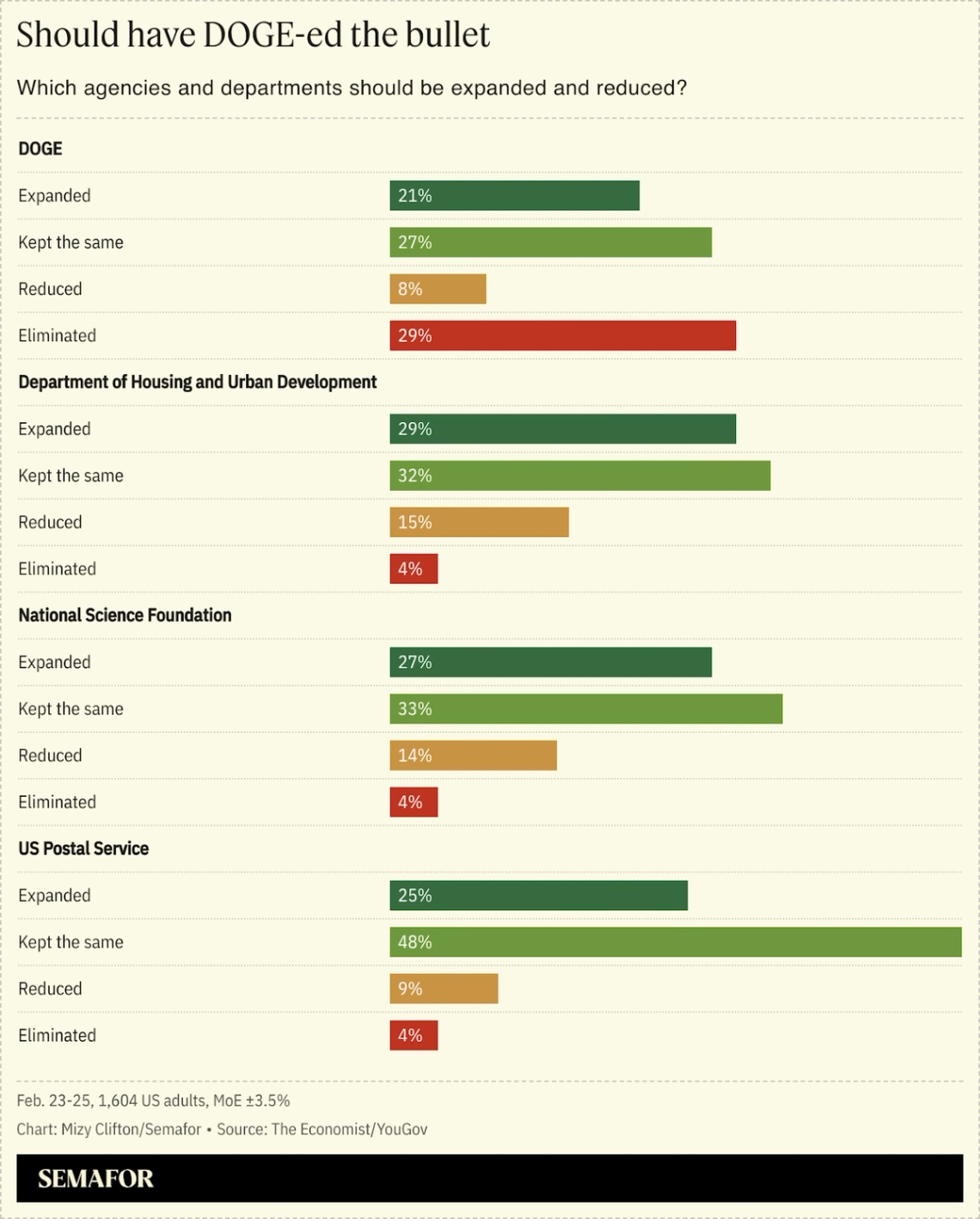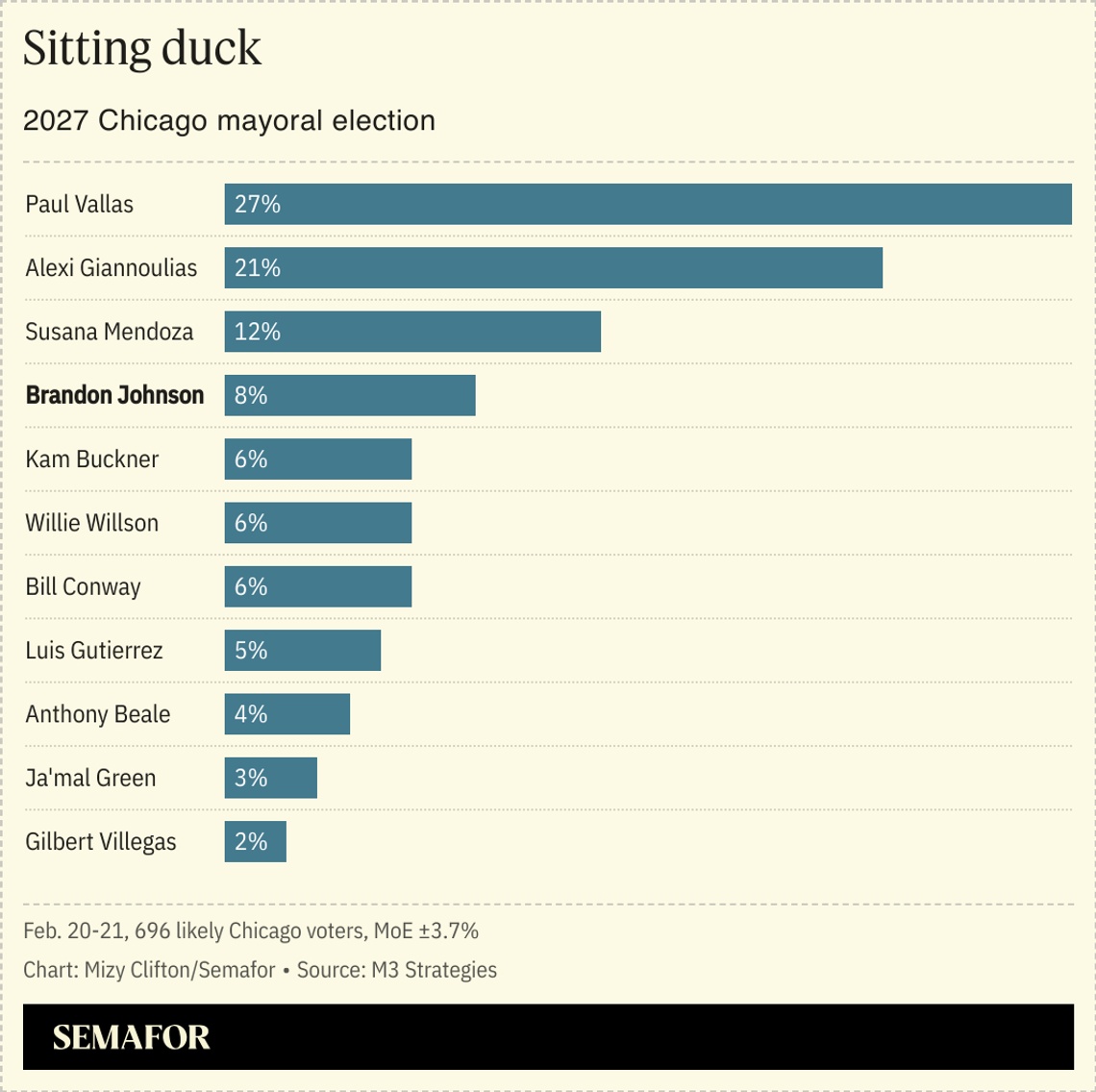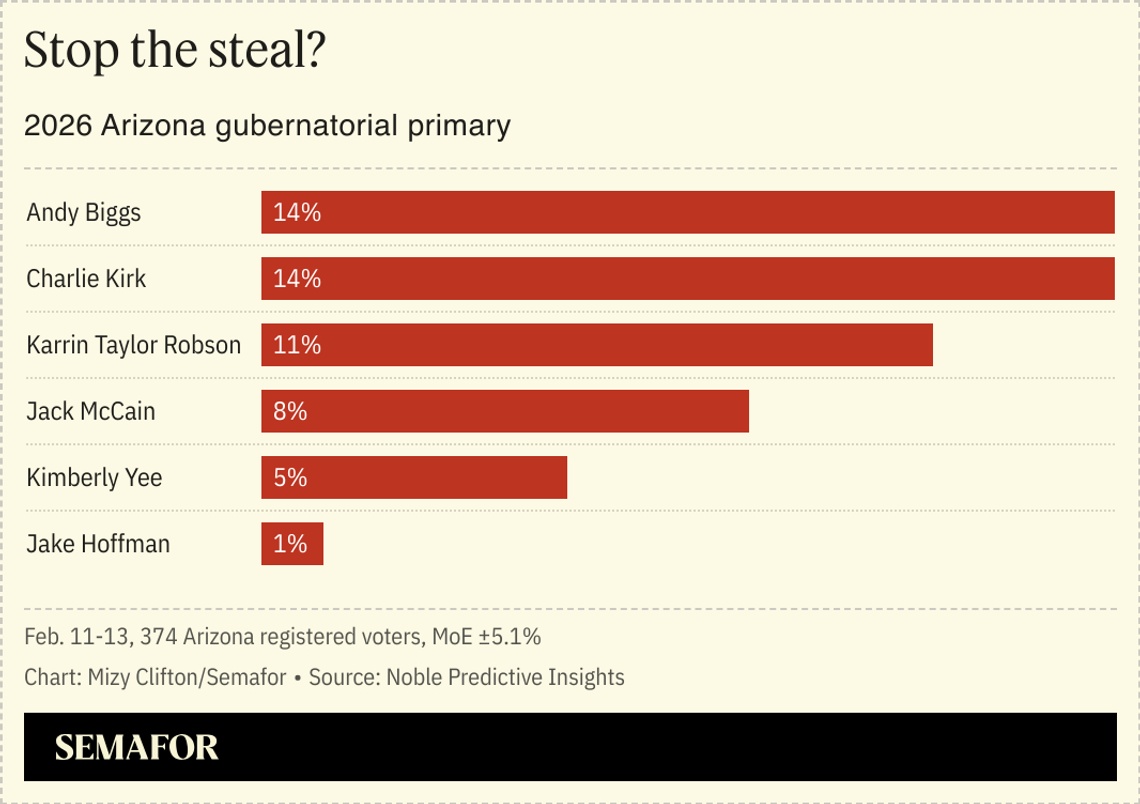 Polls The paradox of DOGE is that it’s less popular than the government agencies it’s assigned to shrink down or eliminate. The rub is that the opposition is largely driven by people who didn’t vote for Donald Trump in the first place. Sixty-two percent of Democrats want to limit or eliminate DOGE, and 87% are concerned that Elon Musk will benefit personally from its work. (So are 56% of independents and 29% of Republicans, suggesting that the argument could have legs for Democrats.) Republicans are far less interested in reducing agencies, with 40% in favor of breaking down HUD, and fewer in favor of breaking down anything else. Voters don’t see those agencies as hotbeds of waste and fraud right now.  Chicago Mayor Brandon Johnson ran a perfect campaign two years ago, eking into the runoff, then winning the general election by highlighting Paul Vallas’ criticism of Democrats. (Criticizing Barack Obama is a risk in the 85% Democratic city that elected him.) This pollster — which saw Johnson’s strength in 2023 — now finds him lagging badly in a reelect, with four-fifths of voters viewing him unfavorably. That’s a weaker position than ex-Mayor Lori Lightfoot was in when she came in third in the 2023 race, opening the door to Johnson.  Arizona Gov. Katie Hobbs barely won her first term in 2022. Beating her next year is a top Republican priority; it would remove their major impediment to the election changes they wanted in place for 2024. But Democrats like Hobbs’ chances if she faces a “Stop the Steal” Republican, and two of them are the best-known, best-liked candidates among GOP primary voters. Kirk, the Turning Point USA/Action founder who modeled his organization’s turnout in the state, has the highest raw favorable number (45%) despite never seeking office before; Robson, who has Trump’s endorsement but challenged Trump endorsee Kari Lake in the 2022 primary, is just behind. Half of the potential electorate has no view of these options, but the plurality of the early vote is going to Kirk, 2020 election challenger Biggs, and Hoffman, indicted in that election’s “fake elector” scheme. Ads Virginia House Democrats/YouTube Virginia House Democrats/YouTube- House Democratic Caucus, “Chaos.” Virginia’s House Democrats, hoping to expand their narrow majorities this year, kicked off the week with 12 ads in their targeted districts. They link each Republican incumbent to Donald Trump and Elon Musk, accusing each of “following the leader” — illustrated by Trump and Musk, together. “Our jobs lost, our grocery prices up,” says a narrator, blaming the Republican drive for spending and tax cuts. (Democrats are also cognizant of an effective GOP argument in 2021, that they would cut grocery taxes as the incumbent party did nothing to fight inflation.)
- Republican State Leadership Committee, “Crazy.” Trump won 49.7% of the vote in Wisconsin last year, but Republicans know that they lose off-year elections in the state when their less-likely voters — the ones who only show up for Trump — stay home. In 2019, Republicans charged up their turnout in the state supreme court race by invoking Brett Kavanaugh’s confirmation hearings. Here, the RSLC frames the election as a second Trump referendum, and stopping Democratic Party-backed nominee Susan Crawford as the only way to prevent “sanctuary cities.”
- Josh Gottheimer for Governor, “Over There.” Two House Democrats are running for governor of New Jersey. Both of them are positioning themselves as Trump fighters who’ll cut the cost of living. “Egg prices keep going up, and costs everywhere are getting worse,” says Rep. Gottheimer here, standing in front of the White House to reminisce about working for Bill Clinton (“creating jobs, making health care affordable”), the only Democrat mentioned by name.
Scooped!Not many House Republicans truly mattered on Tuesday. Most of them were set on supporting the party’s budget resolution, which was sold to them as a shell to fill in later. A handful told reporters that they didn’t want to support it. Only one, Kentucky Rep. Thomas Massie, stuck to his word. The thinking of the other, softer holdouts was best captured by Leigh Ann Caldwell at Puck and the Rubin/Beavers/Hughes power trio at The Wall Street Journal. See: A debt-obsessed Tea Party Republican hand his voting card to the speaker! Hear: Victoria Spartz get barracked by the president! Next - 32 days until Wisconsin’s state supreme court election
- 249 days until off-year elections
- 612 days until the 2026 midterm elections
David RecommendsOn Thursday afternoon, a fight broke out between the conservative influencers who thought they were replacing the media. Conservatives who’ve built massive followings as “DC Draino” and “Libs of TikTok” got invited to the White House and handed binders of “Epstein Files,” holding them up triumphantly for what they called “legacy media” photographers, before discovering that they contained redacted versions of information about the late Jeffrey Epstein that had been published elsewhere. The embarrassment is still playing out on social media, influencer on influencer; the larger context is in this piece from the anonymous writer Cartoons Hate Her, who is, horrifyingly, more online than me. “There are simply too many people trying to be the next big thing, and all these aspiring starlets … need to be willing to do more and more outrageous and degrading things in order to get the attention (and presumably, money) they desire, before fizzling out.” |